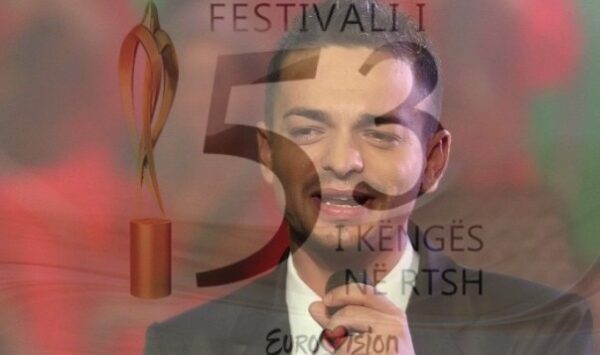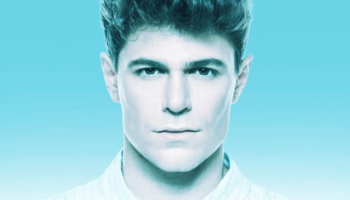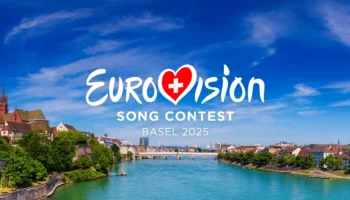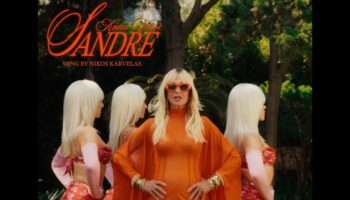Hello Klajdi, this is esctoday.com calling! Thank you for agreeing on this interview with us! After a break from the music scene you decide to come back at Festivali I Kenges, how did this decision come about?
I salute and thank you for the interview. I’m back to Festivali i Kenges organized by RTSH because I miss the emotions of live singing, I miss the magical scene and the atmosphere of the festival, as I also miss and am missed by my fans, who have pushed and suggested me to participate in this event, the only “live” important festival in our country. In the artistic perception, it’s the only environment where I sail upon the orchestra’s violins and I feel revived artistically by being inspired from the live orchestra’s magic.
This year RTSH had 50 entries that applied for a spot. How does it feel being one of the 28 to proceed in the final nights?
Of course I am content to have passed the first phase and I want to thank the jury for selecting me in the middle of the 28 other artists and gave me the opportunity to present my creation to the public. I feel ready to artistically face every colleague and friend who also participates in this edition and of course I would feel even better if the jury would award my song with a prize, as well as applause from the public.
Your entry for Festivali I Kenges was composed by none other than you with lyrics penned by Jorgo Papingji. Is it more natural and organic singing a song that you composed yourself?
When you create something for yourself it’s kind of easier because you know how much you can achieve (musically-wise) and also you can express and feel what you want. Jorgo Papingji helped me pen the lyrics which was just right for me, as if I had written it myself. Also Jorgo as a psychologist has his own merits as he understands what you’re looking for and knits the words beautifully.
Your song is called “I only trust in you”. Can you reveal for us what is the song about and are the lyrics personal?
Actually the title I only trust in you was chosen by me rapidly. Jorgo wanted to name it First love as it is a song that talks about and reminds everyone’s first love and also the drama of never ending up together almost never.
This year, Festivali has a stong competition. On one side there’s the media who is talking about a possible Elhaida Dani win and on the other side there is the rest of the public who wants to hear all the entries. Does this “pressure” of the competition make the participation even better?
This is absolutely no pressure, but even more emotion. Every singer “faces” each other in the artistic sense and as it is an open competition this makes it even more interesting. Elhaida, Klajdi, Emi or whoever, above all participates for the emotions that FiK gives, the public, and than also thinks about winning.
Klajdi, it is now a tradition that Festivali’s winner represents Albania in the Eurovision Song Contest. If you win FiK, it won’t be the first time you touch the Eurovision stage as you have been a back-vocalist for the first ever representative of Albania in 2004 with Anjeza Shahini and “Image of you”. Do you remember your experience back then?
Of course it was an unforgettable experience and because I liked it as a back vocalist I’m hoping to experience it as a lead singer too. Eurovision is the bridge that lunches you to the European music market, also one of the only windows where beautiful Albanian music can be represented and confront that of other countries.
Has the Eurovision factor impacted the song creation or was it not intended for further participations?
I started and I created a song which I wanted to create and present. I’ve only though of the music, lyrics, orchestration and arrangement and the emotions that I want to give out. Every song can go to Eurovision, there is no set formula, it’s about the melody.
The 2004 Albanian delegation with Anjeza Shahini as a representative set a record in placement that wasn’t broken until 2 years ago in 2012 with Rona Nishliu’s “Suus”. Why do you think was it so hard to break that record? Is it a matter of song quality or just the voting?
I believe that maybe the voting or the “neighbor” voting is a factor in the evaluation of songs. In the case of Anjeza as well as in Rona I can guarantee you that we haven’t had any kind of “political” support but it was the melody and the music that won the public’s votes and herts. Now, I’m hoping we’re going to get more sympathy and votes from the competing country as a part of Europe.
This year’s winner Conchita Wurst made big noise for her stage persona “the bearded lady”. Albania was one of the states that didn’t receive her victory with positive tones. What is your opinion on her?
I really liked his music and song, I don’t want to talk about the prejudice and the judgment made by the media for his performance in Eurovision. You can listen to music with eyes closed and it doesn’t matter who is singing, black, white, gay, straight or whatever.
Klajdi on behalf of esctoday.com we would like to wish you success in your presentation in the 53rd Festivali I Kenges and thank you for your time!
Thank you and I hope I win! (:P)
Below you can listen’s to some of Klajdi’s songs and also see him as a back-vocalist in the 2004 Eurovision Song Contest:
http://www.youtube.com/watch?v=IjKLOsmHViM




